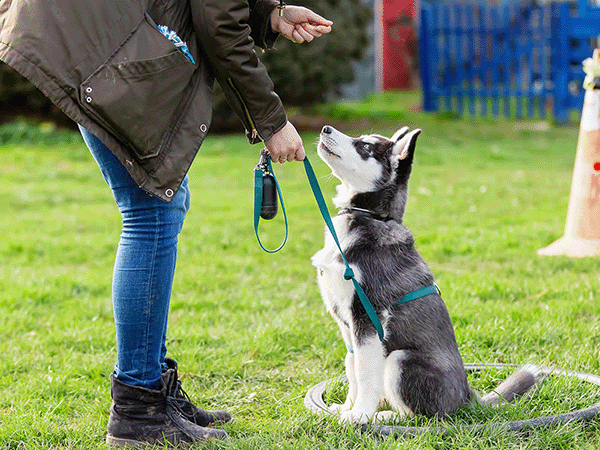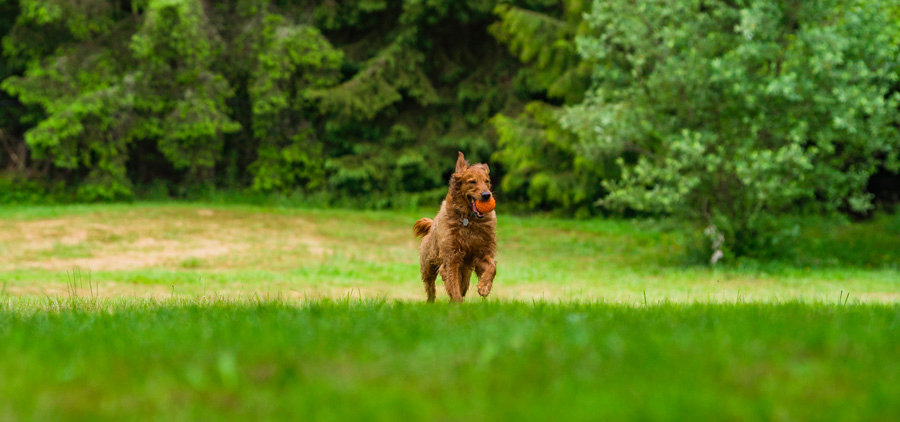Rottweiler Magic: 9K Owners on Their Steady, Loving Nature

Discover the Rottweiler, a breed standard celebrated for its affectionate, playful, and loyal nature. Recognized as a large dog, Rottweilers have their origins in Germany, where they were initially bred for herding, guarding, and protection around 2,000 years ago.
In this post, we share insights from nearly 10,000 Sniffspot users, offering practical advice for new and prospective Rottweiler owners. Whether you’re considering adopting or rescuing a Rottweiler or already have one, you’ll find valuable tips on how to care for and enjoy life with an affectionate Rottweiler.
Are Rottweilers velcro dogs? Like Sniffspot user Jess says, “They’re velcro dogs and will do anything for their person.” But there's more to these intelligent dogs than just constant companionship. They're also playful, sometimes stubborn, and definitely complex. Using insights from almost 10,000 Sniffspot users, we'll explore whether Rottweilers are truly velcro dogs and offer practical advice on training, health, and finding the perfect environment for this fascinating breed.
Source: Sniffspot Community Breed Survey 2024
Rottweiler at a Glance
- Breed Type: Working
- Size: Large
- Life Expectancy: 9 to 10 years
- Healthy Weight Range: 95 to 135 lbs.
- Height Range: 22 to 27 inches
- Temperament: Affectionate, Playful, Loyal
- Coat Type: Short
- Color: Black with tan or mahogany markings
Getting to Know the Rottweiler
According to nearly 10,000 Sniffspot community users who shared real-world data about their Rottweilers, these dogs are known for their affectionate and friendly nature. They are also social with children and other pets.
When living with a Rottweiler, 88% of our owners indicated that a large house with a fenced yard is ideal. Additionally, 42% of owners found that a rural or suburban area with open spaces is also acceptable. This breed is highly trainable by all types of dog owners, and Rottweilers learn best with positive reinforcement, consistent routines, and socialization.
In terms of exercise, 48% of Sniffspot owners say their Rottweiler benefits from moderate exercise every day, including between 1-2 hours of activity such as walks and active play sessions. The Sniffspot Rottweiler community does not recommend this breed for first-time owners.
Key Takeaways
- Rottweilers are affectionate companions: Known for their loyalty and love for their families, Rottweilers thrive on close bonds and benefit from positive reinforcement training.
- Responsible Rottweiler ownership requires commitment: Training, socialization, and providing adequate exercise are key. Research reputable breeders or rescues and understand their specific needs.
- Sniffspot connects you with ideal spaces: From dog parks to resources, Sniffspot helps you provide enriching experiences for your Rottweiler.
Origins of the Rottweiler
Rottweilers are known for their loyalty, intelligence, and bravery, radiating dignity and self-assurance. Their impressive and adaptable nature has attracted people for thousands of years.
The Rottweiler’s lineage dates back over 2,000 years to the Roman Empire. These resilient dogs accompanied Roman soldiers, herding cattle and guarding livestock. In ancient Rottweil, Germany, they were essential for transporting meat to market, often carrying money in a pouch around their necks—a clever deterrent for thieves. This earned them the title “Butcher’s Dog of Rottweil.”
Despite a decline in numbers during the Industrial Revolution, dedicated breeders preserved the breed. By the early 20th century, Rottweilers were valued as police dogs and loyal companions. Today, they are beloved for their combination of affection and protection, thriving as family pets and therapy animals. Their blend of strength and warmth continues to charm people everywhere.
Key Rottweiler Traits and Characteristics
- Temperament: Affectionate, Playful, Loyal
- Energy Level: Moderate
- Trainability: Highly trainable – Learns commands quickly and responds well to training.
- Grooming Needs: Low maintenance – Requires minimal grooming, such as occasional brushing and baths.
- Good with Kids: Very friendly and social with children
- Good with Other Pets: Very friendly with other pets
The "Velcro Dog" Tendency: Myth or Reality?
Rottweilers are often described as "velcro dogs" because of their strong attachment to their owners. They genuinely enjoy being close to their families and often follow them from room to room. This isn't simply clinginess; it's a testament to their loyal and affectionate nature. Many Rottweiler owners share stories of their dogs being constant companions, always by their side.
Understanding the Rottweiler's Need for Closeness
This desire for closeness stems from the Rottweiler's history as a working breed. They were bred to work alongside humans, forging strong bonds of trust and cooperation. This inherent need for companionship translates into a deep affection for their families. Rottweilers thrive in family environments and can be excellent companions for children with proper socialization and training. Finding the right space for your Rottweiler is important, and many owners find that Sniffspot's dog parks offer a safe and enriching environment for their Rottweilers to socialize and play.
Do Rottweilers Bond with One Person?
While Rottweilers are affectionate with the entire family, they sometimes form an especially strong bond with one person. This person often becomes their primary caregiver, the one they look to for guidance and affection. This strong attachment doesn't mean they ignore other family members, but they may show a clear preference for their chosen person. This close bond makes training and finding the right trainer even more important for a well-behaved and happy Rottweiler.
Rottweilers vs. Dobermans: Comparing "Velcro" Traits
Interestingly, while Rottweilers are known for their loyalty, other breeds, like Dobermans, are often considered even more "velcro-like." Dobermans often display a greater need to be constantly by their owner's side. Rottweilers, while still affectionate, tend to be slightly more independent, content with exploring their surroundings, especially in a secure environment like a Sniffspot park.
Unique Rottweiler Behaviors
Beyond their "velcro dog" tendencies, Rottweilers have other unique behaviors that add to their charm.
Decoding the Rottweiler Rumble
Rottweilers are known for their deep, rumbling growls. While this might sound intimidating to those unfamiliar with the breed, it's often a form of communication rather than aggression. These rumbles can be expressions of contentment, excitement, or even just a way of "talking" to their loved ones. Understanding these vocalizations is key to building a strong relationship with a Rottweiler. If you're considering adding a Rottweiler to your family, exploring popular dog names can be a fun way to prepare for your new companion.
The "Lap Dog Delusion"
Despite their large size, Rottweilers often have a "lap dog delusion." They seem to believe they are tiny pups and will try to squeeze onto your lap for cuddles. This endearing quirk highlights their affectionate nature and desire for closeness, even if their size makes it a bit impractical. Creating a comfortable and safe space for your Rottweiler, whether it's a cozy corner at home or a visit to a dog-friendly water park through Sniffspot, is essential for their happiness.
Herding Instincts
As a breed with a herding background, Rottweilers sometimes exhibit herding behaviors with their human families. This might manifest as gently nudging family members, especially children, or trying to keep everyone together. It's a harmless and often amusing remnant of their working dog instincts. Providing opportunities for your Rottweiler to engage in activities that stimulate their herding instincts, such as playing fetch in a private dog park found on Sniffspot, can be a great way to channel their energy and keep them entertained.
Rottweiler Ownership: What to Expect
As a Rottweiler owner, it’s important to understand the breed’s needs and what to expect. Be prepared for a dedicated commitment to training, exercise, and socialization to ensure a well-adjusted and happy Rottweiler.

Source: Sniffspot Community Breed Research 2024
Rottweiler Grooming Guide
Rottweilers require low-maintenance grooming. Their short coat, designed for protection and insulation, sheds moderately. To maintain a healthy coat, include brushing in their routine and keep them clean. Grooming needs are minimal compared to other working breeds.
Exercise Essentials for Rottweilers
Rottweilers need moderate daily exercise to avoid destructive behaviors. They thrive with 1-2 hours of activity, including walks and active play. Engaging in activities like tug-of-war, playing with squeaky toys, and chasing balls or frisbees helps them stay fit. Without sufficient exercise, they may develop undesirable behaviors such as aggression and stubbornness.
Feeding Your Rottweiler
To keep your Rottweiler healthy, feed them appropriate amounts of food based on their activity level. A reported 58% of our community feeds their Rottweiler commercial dry kibble. With moderate exercise, they should eat 2.5 to 3.5 cups of food daily to maintain a healthy weight of 95 to 135 lbs. Adjust food quantities based on your Rottweiler’s sex, activity level, and age.
Common Rottweiler Health Issues
Rottweilers are prone to joint problems (e.g., hip dysplasia, arthritis) and ear infections. 56% of our owners reported issues like arthritis and elbow dysplasia, while 26% noted ear infections. Additionally, 24% reported skin conditions such as allergies and yeast infections.
When it comes to their digestive challenges, many owners report Gastric Dilatation-volvulus, also known as bloat, which can be life-threatening if you don’t recognize the signs. Regular veterinary check-ups can help manage these health concerns.
Are Rottweilers Friendly?
Another important thing to consider when adopting a Rottie is whether or not they fit with your current family. How friendly are Rottweilers compared to other large-sized breeds?

Source: Sniffspot Community Breed Survey 2024
With consistent training, you can hone your Rottie’s working instinct into an affectionate and playful family dog. Introducing your pet to positive reinforcement (treats, praise, rewards) and consistent daily training routines early helps them avoid undesirable behaviors like aggression and stubbornness. Our community Rottweiler owners comment on their pet’s friendliness:
- They are loveable. Kind. Loyal. Sweet. Playful. They also have an amazing personality. (Anon)
- Rottweilers are very affectionate, loyal, and love hanging out with their family. They are great fun to have around, being quite goofy and playful. (Mary)
- He’s just a big goofball. He thinks he’s so tiny and loves everyone and everything. (EE)
Training Your Rottweiler
Whether you’re adopting a Rottie puppy or an adult Rottweiler, training is a significant part of owning a large-sized breed. Without proper training, your Rottie is more likely to display undesirable behaviors such as aggression and stubbornness. Providing stimulating activities is a great first step, but this needs to be paired with the right training for your Rottie.
As a working breed, Rottweilers benefit from praise and positive reinforcement. Many pet parents recommend training classes paired with physical exercise. Here’s what our Rottie community recommended based on their experience with their own dogs:
- Positive Reinforcement (93%): This includes treats, praise, rewards, and so on for positive behavior
- Consistent Routines (54%): A consistent training routine allows your pet to get comfortable with expectations
- Socialization (52%): Socializing your dog with other pets, dogs, and people prepares them to interact with the world
As dogs bred for herding, guarding, and protection, Rotties are considered highly trainable by all types of dog owners.
Understanding Your Rottweiler's Training Style
While protective instincts and alertness are common behavior patterns in Rottweilers, it’s important to recognize that this breed is prone to developing strong attachments to their families. Many breed clubs emphasize that despite their imposing appearance, these dogs require additional training to manage another common behavior: their tendency to be headstrong. The breed is prone to testing boundaries, making early socialization crucial.
Working with breed clubs can provide valuable resources for crate training, which helps prevent boredom-driven behaviors like destructive chewing. When implementing commands in training sessions, consistency is key – these intelligent dogs respond well to structure. However, if traditional commands in training sessions aren’t effective, handlers should be ready to try alternative behavior modification approaches. Additional training may be needed to address specific boredom-driven behaviors, particularly during adolescence. Teaching alternative behavior responses to triggering situations can help channel their natural guarding instincts appropriately.
Kevin Seibel on Unsplash
Are Rottweilers Good in Cold Weather?
While not typically classified among traditional cold-weather breeds, Rottweilers handle winter conditions remarkably well thanks to their robust build. The American Rottweiler Club recommends maintaining regular physical activity even in colder months, as these high-energy breeds need consistent aerobic exercise to stay healthy.
Like many active breeds, Rottweilers can make ideal companions for winter sports enthusiasts, though owners should monitor them during extreme weather conditions. When outdoor activities must be limited, enrichment activities become especially important for these intelligent companion animals.
Despite their adaptability, these high-energy breeds still require creative indoor physical activity options—the American Rottweiler Club suggests puzzle toys and indoor agility as excellent enrichment activities. While some cold-weather breeds naturally thrive in freezing temperatures, Rottweilers demonstrate impressive resilience as active breeds when given appropriate shelter and protection during extreme weather conditions. Indoor games and training can provide both mental stimulation and aerobic exercise, making them ideal companions year-round.
Why Rottweiler Owners Love Their Dogs
We asked Sniffspot Rottie owners what they love the most about their Rottweiler pups, and here’s what they had to say:
- They are loyal and so smart. Always down to cuddle, though they do need a lot of physical exercise and mental activity as part of their proper care. (Breanna)
- I have 4 rottie mixes (one is purebred), and I run a rescue where we specialize in power breeds. I love how loyal and loving Rotties can be. They are incredibly intelligent but so often misunderstood and mistreated. They can be very goofy and silly, then serious and protective at a moment’s notice. They are an amazing companion for those who understand them and their needs. (Rachel)
- Smart, calm, and loyal but needs to work/train daily to keep in a calm state. Not a dog for novice pet parents! (Xander the Great)
Challenges of Rottweiler Ownership
Similarly, Rottie owners shared some of the biggest challenges of living with their Rottweiler:
- They are not going to be your Meet & Greet Everyone dog; they are selectively bred to be protective of the home and their family and need proper introductions to new people and animals, along with proper socialization throughout their lifetimes. (Jess)
- They are strong and they are often stubborn. We see a lot of this breed get abused and then surrendered or euthanized due to unwanted behavior. They thrive on positive reinforcement, and the opposite can have serious reactions from them. They need to be managed properly, and a lot of people don’t have the knowledge or experience to raise them well. (Rachel)
- They don’t know how big they are, so they sometimes squish you when they want to sit on your lap. Pet parents beware! (Slexy)
Are Rottweilers Good for First-Time Owners?

Source: Sniffspot 2024 Community Dog Breed Survey
According to 81% of our Sniffspot community, Rottweilers are not a great first-time dog. This comes from their affectionate nature and moderate exercise needs. Rottweiler owners say it best:
- Smart, calm, and loyal but needs to work/train daily to keep in a calm state. Not a dog for the novice owner. (Xander the Great)
- She’s very calm but also very persistent in wanting affection. (RA)
- They’re vocal and their personalities are unique! Rotties are extremely intelligent but they are also the literal definition of ADHD. (j)
Tips for Rottweiler Owners
Luckily, our Sniffspot community is full of experienced, trustworthy Rottie owners. These Rottweiler breed owners share the most essential dog breed tips and advice for prospective or new dog owners:
Finding the Right Rottweiler for You
Bringing a Rottweiler into your life is a big decision. It’s essential to find a dog whose temperament and needs align with your lifestyle. Whether you're adopting or buying, doing your research beforehand is key to a happy partnership.
Choosing a Reputable Breeder
If you decide to buy a Rottweiler puppy, choosing a reputable breeder is paramount. A good breeder prioritizes the health and temperament of their dogs. They'll screen their breeding dogs for health issues like hip and elbow dysplasia, common in Rottweilers, and focus on breeding dogs with stable, friendly personalities. This careful approach helps minimize the risk of future problems. A responsible breeder will also be knowledgeable about the breed and happy to answer your questions, offer guidance, and provide ongoing support. They should also allow you to meet the puppy's parents and see their environment. For more tips on finding ethical breeders, check out the American Kennel Club's guide.
Remember, finding the right breeder is an investment in your future dog's well-being. It's worth taking the time to research and find a breeder who shares your commitment to responsible dog ownership. If a breeder seems more interested in a quick sale than in the welfare of their dogs, that's a red flag. Trust your instincts and walk away if something doesn't feel right.
Considering German vs. American Rottweilers
You might hear people talk about "German" and "American" Rottweilers. While the American Kennel Club (AKC) recognizes a single breed standard, subtle differences in appearance and temperament have emerged between dogs bred in Germany and the US. Generally, German Rottweilers tend to be larger and stockier, with a more serious and reserved demeanor. American Rottweilers are often slightly smaller and leaner, sometimes described as more outgoing and playful. These are generalizations, and individual dogs will vary. Embrace Pet Insurance offers a helpful overview of these distinctions.
The most important thing is to choose a dog whose personality fits your lifestyle. If you're looking for a cuddly companion who's always up for a game of fetch, a more laid-back American Rottweiler might be a good fit. If you prefer a dog with a more watchful and protective nature, a German Rottweiler might suit you better. Regardless of lineage, early socialization and consistent training are crucial for any Rottweiler. Consider visiting Sniffspot to find safe, private spaces for your Rottweiler to socialize and play.
Leadership and Consistency with Your Rottweiler
- YOU have to put the work in!! Daily REPEATEDLY they want a job to do! Training and being the Alpha is important. But the love and loyalty you get from a Rottweiler is immeasurable. (Jessica)
- Research this breed in advance. (Melanie)
Preparing for a Rottweiler
- Do your research; be knowledgeable about the breed. Expose them to almost everything at a young age. (Devon)
- Please do your research! If you think you’ve done a lot of research already, then do more and never stop learning! The reason I wouldn’t recommend this breed to first-time dog owners isn’t because Rottweilers are “bad” or “difficult,” it’s because too many people get this breed without proper knowledge on how to handle them. Then they make the breed look bad when they are truly just misunderstood. Rottweilers are big, strong, and VERY smart. (Chloe)
Mental Enrichment for Your Rottweiler
- Make sure you fulfill them physically and mentally. They are a working breed, so teaching them how to do nothing can be challenging. (ST)
- This breed will think and make decisions on their own. They require mental and physical activity to thrive. (AJ)
When to Seek Professional Training
- This is a very powerful dog breed and needs proper training with a professional. Loyal, loving, and protective. Only buy from a reputable breeder that breeds for temperament and health. Socialize early and often. (NP)
- Professional training and regular reinforcement, especially with leash manners. (Wanda)
Finding Dog-Friendly Spaces for Your Rottweiler
Given their affectionate nature and need for regular exercise, finding the right spaces for your Rottweiler to play and socialize is essential. Our Sniffspot community research shows that Rottweilers thrive in environments where they can run, play, and interact with their families, and potentially other dogs, depending on their individual personalities. Remember, 88% of Rottweiler owners in our community prefer a large house with a fenced yard, highlighting the importance of secure spaces for these large, active dogs.
But what if your own backyard isn't quite enough, or you're looking for new places to explore with your furry friend? That's where Sniffspot comes in. We understand that not every dog park is suitable, and finding a safe environment for your Rottweiler is paramount. That's why we connect dog owners with private, dog-friendly parks and spaces where your Rottweiler can enjoy off-leash freedom without the worries of overcrowding or unpredictable interactions with other dogs.
Sniffspot: Connecting Dog Owners with Safe and Secure Parks
Sniffspot offers a variety of dog parks tailored to different needs. Whether you're looking for a dog water park for a refreshing splash, hiking trails to burn off some energy, or indoor parks for days when the weather isn't cooperating, Sniffspot has options for you and your Rottweiler. With Sniffspot, you can find a secure and stimulating environment where your dog can enjoy the 1–2 hours of daily exercise they need, as recommended by our community's research.
Beyond just providing spaces, Sniffspot fosters a community of dog lovers. Our platform allows users to become hosts and list their dog-friendly spaces, creating a network of safe havens for dogs of all breeds and sizes. This community aspect is invaluable for Rottweiler owners, as it provides opportunities for socialization in controlled environments, which is crucial for this breed. Our research indicates that Rottweilers are generally social with children and other pets, but providing them with positive socialization experiences from a young age is key to ensuring they develop into well-adjusted adults. Sniffspot can help facilitate these vital interactions.
Frequently Asked Questions about the Rottweiler
Rottweiler Lifespan
The average lifespan of a Rottweiler is typically between 9 and 10 years.
Rottweiler Size and Growth
An adult Rottweiler weighs between 95 and 135 lbs and stands between 22 and 27 inches tall.
Rottweiler Grooming Needs
Rottweilers require low-maintenance grooming. Their short coat is designed for protection and insulation, making regular grooming relatively easy. Brush weekly to keep their coat healthy and manageable, as they are moderate shedders.
Rottweiler Exercise Requirements
Rottweilers need moderate daily exercise. This breed is moderately athletic and somewhat high-energy. Aim for 1-2 hours of activity each day, including walks and active play. They enjoy tug-of-war, squeaky toys, and playing with balls or frisbees. Without sufficient exercise, Rottweilers may develop unwanted behaviors.
Rottweilers and Children
According to our data, Rottweilers are very friendly and social with children.
Rottweilers and Other Pets
Our research indicates that Rottweilers are very friendly with other pets.
Best Food Choices for Rottweilers
As a moderate-energy breed, a Rottweiler’s diet is crucial, though this breed has a hearty appetite. A significant 58% of our community feeds their Rottweiler commercial dry kibble. For optimal health, Rottweilers should consume 2.5 to 3.5 cups of vet-recommended food daily to maintain a healthy weight of 95 to 135 lbs. Adjust the amount based on your Rottweiler’s sex, activity level, and age.
Common Rottweiler Health Problems
Rottweilers are prone to joint problems such as arthritis, elbow dysplasia, degenerative issues, and osteosarcoma. According to our data, 56% of Rottweiler owners report these joint issues. Additionally, 26% report ear infections due to allergies, ear mites, or contact dermatitis.
Lastly, 24% report skin conditions like allergies, yeast infections, impetigo, ringworm, alopecia, and folliculitis. Consult your veterinarian if you have concerns about these health issues.
Helpful Resources for Rottweiler Owners
Maintaining a healthy Rottweiler requires attention to multiple aspects of care, from managing their double coat through regular grooming to monitoring their body condition for optimal health. While their barking habit can be effectively managed using positive reinforcement techniques, such as rewarding quiet behavior and teaching “quiet” commands, success depends on consistency.
In hot climates, owners must take extra precautions to prevent overheating, as these dogs’ thick coats and muscular build make them sensitive to environmental factors. Joint supplements play a crucial role in supporting their musculoskeletal health, with glucosamine and chondroitin being common examples.
Regular administration of joint supplements, combined with proper exercise and weight management, helps prevent mobility issues as they age. By understanding these care requirements and applying positive reinforcement techniques in training, owners can help their Rottweilers thrive while maintaining excellent coat health and overall well-being.
Whether you’re a current Rottweiler owner or considering adopting one, Sniffspot has valuable resources to help:
Sources:
Most recent articles
Related articles
Top dog guides per area
Dog training guides

Dog Food Aggression: Why You Shouldn't Punish It
Does your dog ever growl when you walk by their food dish? Maybe they get possessive of treats, carrying them far away and giving you side-eye when you start to approach — or snarling at your other pets or children if they get too close.

Best Dog Fields in the US: 25+ Wide-Open Spaces for Your Pup to Run Free
The best dog fields in the US offer something that traditional enclosed parks simply can't match: acres of open space where your pup can truly stretch their legs and run at full speed. From Colorado's 470-acre prairie meadows to Tennessee's award-winning "Outback," these wide-open spaces allow dogs to roam, explore, and exercise naturally while engaging instincts that cramped urban parks suppress.

The Ultimate Guide to Scent Training for Dogs
Your dog's nose is an amazing tool. Did you know they have 40 times the olfactory receptors than humans? Scent training for dogs taps into this superpower, turning everyday moments into exciting sniff-fests. It's enriching for all types of dogs – reactive, shy, or simply adventurous. Ready to explore the world of scent work for dogs? Let's get started.

Service Dog Training Costs: DIY vs. Pro
More than 80 million Americans rely on their service dogs to help them navigate the world. Task-trained assistance animals perform a huge range of life-changing—in many cases, life-saving—services: These dogs act as eyes for visually impaired handlers, provide mobility support, alert to seizures and blood sugar crashes, interrupt anxiety attacks, remind their people to take medications, and so much more.

How to Deal With Puppy Potty Training Regression
You thought those dreaded middle-of-the-night potty breaks were over. You were finally free from cleaning up puppy puddles. Then, suddenly, your furry friend starts having accidents again. It's frustrating, right? This puppy potty training regression is more common than you think. Don't worry; we'll help you get your pup back on track. We'll cover the common causes, offer practical solutions, and give you actionable steps to tackle this challenge together.

Dirty Dog Syndrome: Causes, Solutions, and Prevention
It's a cringe-worthy moment every dog owner dreads: your furry friend chowing down on something truly disgusting. If your dog has a penchant for poop, you're dealing with coprophagia. It's more common than you think, and thankfully, often manageable. This article explores the reasons behind dirty dog syndrome, from instinct to learned behavior. We'll also give you practical tips to help break this unpleasant habit.

How to Train Your Rescue Dog: A Complete Guide
* All Sniffspot articles are reviewed by certified trainers for quality, please see bottom of article for details *
Dog enrichment guides

Best Dog Water Parks in the US: 15+ Amazing Splash Destinations for Your Pup
Do you have a water-loving dog looking to burn some energy? There are countless dog parks to visit throughout our country — but some of them become far too hot in the midday sun to be safe for your pets to play. That’s why we’ve put together a list of some of the best dog water parks throughout the United States! At these locations, your pup can frolic, splash, and swim to their heart’s content.

Best Dog Fields in the US: 25+ Wide-Open Spaces for Your Pup to Run Free
The best dog fields in the US offer something that traditional enclosed parks simply can't match: acres of open space where your pup can truly stretch their legs and run at full speed. From Colorado's 470-acre prairie meadows to Tennessee's award-winning "Outback," these wide-open spaces allow dogs to roam, explore, and exercise naturally while engaging instincts that cramped urban parks suppress.

Best Toys for Herding Dogs: Keeping Your Pup Happy & Engaged
Herding dogs are amazing, intelligent companions. But that also means they need more than just a simple game of fetch. Finding the right toys for herding dogs is key to keeping them happy and stimulated. This article explores some of the best toys for herding dogs, including options specifically for breeds like Border Collies and Australian Shepherds. We'll help you discover the perfect herding toys for dogs to tap into their natural instincts and keep them entertained for hours.

Tough Dog Toys for Aggressive Chewers: A Practical Guide
Does your dog destroy every toy you give them? Is your house littered with the remnants of plush toys? Are you tired of wasting money on "indestructible" dog toys for aggressive chewers that don't last? Then this post is for you. We'll cover everything you need to know about finding the best dog toys for aggressive chewers, so you can finally give your pup something safe, durable, and fun.

Daily Exercise Calculator: How Much Exercise Does Your Dog Need?
Everyone knows dogs need exercise, but how much is enough? Walks are great, but creating a truly balanced fitness plan means understanding your dog's specific needs. This post helps you develop a daily exercise calculator for your dog, considering breed, age, and lifestyle. We'll cover fun activities, understanding exercise intensity, and recognizing when your pup has had enough. Let's create a plan that keeps your dog happy and healthy!

Complete Guide To Herding With Dogs
* All Sniffspot articles are reviewed by certified trainers for quality, please see bottom of article for details *

Dog Enrichment Activities: The Ultimate Guide
Ever feel like your dog is restless or bored? They may be getting enough exercise, but still need more. That's where enrichment activities for dogs come in. Giving your dog opportunities to sniff, explore, and problem-solve can make a world of difference. Whether you have a puppy, adult, or senior dog, enriching their environment is key for their well-being. Let's explore how to add cognitive enrichment for dogs, even tailoring activities to your dog's breed with breed specific enrichment and fun enrichment games for dogs.
Dog reactivity guides

Rottweiler Aggression: Truth vs. Myth
Many dogs have gotten a bad reputation over the years for being "dangerous breeds." Rottweilers are among them. Like pit bulls and other large, blocky-headed types of dogs, these powerful and beautiful animals are often assumed to be aggressive.

Best Dog Fields in the US: 25+ Wide-Open Spaces for Your Pup to Run Free
The best dog fields in the US offer something that traditional enclosed parks simply can't match: acres of open space where your pup can truly stretch their legs and run at full speed. From Colorado's 470-acre prairie meadows to Tennessee's award-winning "Outback," these wide-open spaces allow dogs to roam, explore, and exercise naturally while engaging instincts that cramped urban parks suppress.

What Is a Reactive Dog? A Practical Guide for Owners
Does your dog suddenly transform into a barking, lunging Tasmanian devil on walks? It's stressful for both of you. If this sounds familiar, you might have a reactive dog. Understanding what is a reactive dog is the first step to calmer walks. We'll explore the common triggers and give you actionable strategies to manage and modify this behavior. Let's turn those stressful walks into enjoyable outings.

How to Socialize a Reactive Dog: A Step-by-Step Guide
Does your dog display reactivity to other pets or people? Maybe they’re a new rescue pup and are still settling into your home. Or they were sick growing up, so you missed their critical socialization period. Possibly they’ve had a bad experience after being raised as a normal puppy.

What Is a Reactive Dog? A Complete Guide
Is your dog overly excited or fearful around other dogs? Do they bark, lunge, or whine? You might have a reactive dog. Many dog owners face this challenge. Understanding what a reactive dog is is the first step to helping them. This guide explores the common causes of dog reactivity, explains what makes a dog reactive, and offers practical tips and resources. Let's work together to build a stronger bond with your dog and enjoy stress-free walks.

9 Best Online Communities for Reactive Dog Parents
Does your dog's reactivity make walks stressful? You're not alone. Many dog owners face similar challenges. This guide offers practical advice and support for managing reactivity, including finding the best online dog training for reactive dogs. We'll connect you with reactive dog support groups, share training tips, and explore resources like the best dog training app for reactive dogs. Let's build a stronger bond with your dog, together.
* All Sniffspot articles are reviewed by certified trainers for quality, please see bottom of article for details *
How To Groom a Reactive Dog
* All Sniffspot articles are reviewed by certified trainers for quality, please see bottom of article for details *
Sniffspot community guides

The State of Public Dog Parks Across the United States
From 2009 to 2020, there was a 40 percent increase in the development of public dog parks. Designated spots for canine exercise have become commonplace in every major city in North America — many pet owners won’t even consider renting an apartment that doesn’t have its own fenced-in pet area for their canine companions.

Best Dog Fields in the US: 25+ Wide-Open Spaces for Your Pup to Run Free
The best dog fields in the US offer something that traditional enclosed parks simply can't match: acres of open space where your pup can truly stretch their legs and run at full speed. From Colorado's 470-acre prairie meadows to Tennessee's award-winning "Outback," these wide-open spaces allow dogs to roam, explore, and exercise naturally while engaging instincts that cramped urban parks suppress.

How This Family is Affording Their Dream Property Through Renting it Hourly to Dogs
Thousand Oaks, California has been a safe haven for Sniffspot host, Jen, since childhood. Having grown up in busy Santa Barbara, Jen, an introvert from an early age, would seek out solitude and serenity away from tourists attractions and droves of people visiting from elsewhere. “My grandparents own 60 acres about a 30 minute drive from here, and I grew up spending every summer and every holiday visiting them on the ranch,” Jen explained. “In Santa Barbara, we wouldn't go to the beach on the weekend because that's where everybody was, so you'd find places off the beaten path where the tourists weren't. For me, the ranch was just my happy place.”

Host Tips: Ellen K. What Makes Sniffspot Successful for Me
Ellen is the host of Country Pasture Getaway, one of Sniffspot's most popular sniff spots. She has taken the time to write up the lessons she has learned about how to be a great sniff spot host.

How this Oregon Farmer is Making a Business From Renting Her Land to Dogs
Just 20 minutes outside of the busy city of Portland, Oregon, and settled right on the banks of the Columbia River, you’ll find what countless visitors have flocked to the area in search of – mountain views, crisp, clean air, and running water for miles. What you might not expect to find, however, is a hidden oasis designed just for dogs and their people, owned and operated by a farming couple and enjoyed by visitors on two legs, and four.

Host Tips: Fran T. Providing Great Guest Service at our Spot
Fran is the host of Ranch Setting, one of Sniffspot's most popular spots. She has taken the time to write up the lessons she has learned about how to be a great Sniffspot host.

How Sniffspot Helped a Nervous Rescue Work Through His Fears and Change His Family’s Life
This is the story of a family and dog rescuing each other.
Top dog trainers in the US

The Best Dog Trainers in the United States of 2025
This is a list of the top dog trainers in the United States, based on votes from the Sniffspot community and the general public.
The Best Dog Trainers in Seattle, WA of 2025
This is a list of the top dog trainers in Seattle, WA, based on votes from the Sniffspot community and the general public.
The Best Dog Trainers in Portland, OR of 2025
This is a list of the top dog trainers in Portland, OR, based on votes from the Sniffspot community and the general public.
The Best Dog Trainers in Los Angeles, CA of 2025
This is a list of the top dog trainers in Los Angeles, CA, based on votes from the Sniffspot community and the general public.
The Best Dog Trainers in New York, NY of 2025
This is a list of the top dog trainers in New York, NY, based on votes from the Sniffspot community and the general public.
City dog parks guides

Top 10 Indoor Dog Parks: A US Guide
Looking for a space to play with your dog no matter what the weather’s like outside? Look no further than our list of the best indoor dog parks in the United States! These climate-controlled spaces are growing in popularity as pet ownership increases throughout the country. As a bonus, many of them also offer dog training, boarding, grooming, or daycare services on the premises.

Best Dog Fields in the US: 25+ Wide-Open Spaces for Your Pup to Run Free
The best dog fields in the US offer something that traditional enclosed parks simply can't match: acres of open space where your pup can truly stretch their legs and run at full speed. From Colorado's 470-acre prairie meadows to Tennessee's award-winning "Outback," these wide-open spaces allow dogs to roam, explore, and exercise naturally while engaging instincts that cramped urban parks suppress.

Best Dog Parks in the US: Ultimate Guide to Public & Private Off-Leash Adventures
Is your pup giving you those pleading "let me run free" eyes? Whether you're a new dog parent or a seasoned pro looking for fresh adventures, finding the perfect off-leash paradise for your furry friend can feel ruff! From sun-soaked California beaches where your water-loving lab can make a splash to mountain trails in Vermont where your adventure buddy can chase every scent, we've sniffed out the 15 best dog parks across America.

Dog Parks Near Me: Las Vegas Edition
Looking for the perfect dog park near me in Las Vegas? You're in luck! This guide explores all the best options for your pup, from public dog parks to private dog parks near me on Sniffspot. We'll help you find the ideal spot for playtime, socializing, and fresh air. Plus, we'll cover essential etiquette and safety tips to ensure a happy visit for everyone. Get ready for some tail-wagging fun!

Top Sniffspot Locations: Find the Perfect Dog Park
Looking for the perfect dog park? Whether you need a wide-open public space or a private, fenced-in spot, this guide will help you find the best dog parks across the US. We'll cover top-rated public parks, the perks of private dog parks, and even explore Sniffspot locations – giving your pup a safe and fun place to play. Ready to find your dog's new favorite spot? Let's go!

Sniffspot: Portland's Best Private Dog Parks
Ready to discover Portland's best dog parks? Whether you're looking for a public park or the unique experience of a private Sniffspot, this guide has you covered. We'll help you find the perfect spot for your pup, with tips on what to bring, how to prepare, and even understanding dog body language. Plus, we'll explore some top Portland dog parks, including public and Sniffspot options, so you can plan your next dog-friendly adventure in the City of Roses.
Portland Dog Parks: Public & Private Options
This page is about public city dog parks and also includes Sniffspot private dog parks. Sniffspot is the largest network of private dog parks for rent in the world!
Small Dog Park Guide: Tips for Finding the Perfect Spot
Finding the perfect dog park for your small breed can be ruff! Big dog parks can be overwhelming, even dangerous, for little pups. This comprehensive guide helps you sniff out the best small dog parks for your pint-sized companion, covering everything from essential safety checklists to top recommendations for small dog parks across the US—including both public spots and private dog parks.
Dogs breeds

German Shepherd Dogs: Insights From Real Dog Owners
The German Shepherd Dog (GSDs) are known for their intelligence, loyalty, and striking appearance. They're also incredibly versatile, excelling as working dogs and devoted family companions. This guide covers everything you need to know about GSDs, from understanding their unique traits and rich history to practical advice on training and care. So, whether you're a seasoned GSD owner or just starting your research, let's explore this remarkable breed together.

Best Dog Fields in the US: 25+ Wide-Open Spaces for Your Pup to Run Free
The best dog fields in the US offer something that traditional enclosed parks simply can't match: acres of open space where your pup can truly stretch their legs and run at full speed. From Colorado's 470-acre prairie meadows to Tennessee's award-winning "Outback," these wide-open spaces allow dogs to roam, explore, and exercise naturally while engaging instincts that cramped urban parks suppress.

Labrador Retriever: Ultimate Guide by Owners
Discover the Labrador Retriever, a breed celebrated for its playful nature, affectionate temperament, and trainability. Labradors are known for their friendly demeanor and adaptability, making them perfect family companions and versatile working dogs. As one of the most popular types of retrievers, Labs are ideal companions for various lifestyles and are recognized by the American Kennel Club (AKC) as an excellent breed for families.

Golden Retriever Advice: The Complete Owner's Guide
Golden Retrievers: they're gorgeous, playful, and incredibly popular. But before you welcome one into your home, you need the right golden retriever advice. This guide draws on the wisdom of nearly 10,000 Golden Retriever owners, offering practical tips for caring for these affectionate dogs. From understanding their high energy levels to mastering grooming and training, we'll cover everything you need to know. So whether you're already a devoted Golden parent or just starting your research, get ready to learn how to give your furry friend the best possible care.

American Staffordshire Terrier: Your Complete Guide
Think American Staffordshire Terriers are tough? Think again. While their muscular build might intimidate some, these dogs are known for their playful and loyal personalities. This guide draws on the experience of nearly 10,000 AmStaff owners to reveal the truth about this often misunderstood breed. Want to learn more about caring for an American Staffordshire Terrier? You're in the right place.

Australian Shepherd Facts: Breed Info & Care Guide
Discover the Australian Shepherd, an AKC breed celebrated for its trainable, playful, and affectionate nature. Despite its name, the Australian Shepherd is actually a native breed to the United States, originally developed to breed on farms and ranches. Considered a medium dog, Australian Shepherds were bred for herding beginning in the 1950s. As one of the high-energy breeds, Aussies are known for their boundless energy and need for regular exercise, including aerobic exercise.

Essential Husky Facts for Owners: Breed Guide
Discover the Siberian Husky, a breed celebrated for its curious, intelligent, and loyal nature. Considered a medium-sized dog, Siberian Huskies were originally bred in Russia for sledding, beginning in the early 20th Century. Today, they're one of the most popular active breeds in North America.




























